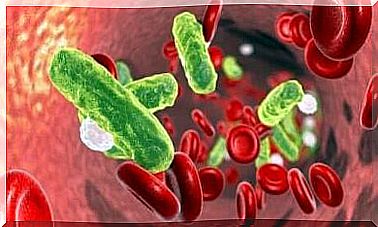How Does The Mediterranean Diet Influence Intestinal Health?

In recent years, the effects of the Mediterranean diet on intestinal health have been the subject of research. Although it is an unexplored link, there are findings of some benefits, especially with regard to the state of the microbiota.
This group of bacteria and microorganisms inhabits the digestive system and plays an important role in health. In fact, they are positively associated with the proper functioning of the immune system, adequate food metabolism, among others.
What does diet have to do with intestinal health? Why is the Mediterranean diet recommended? As a result of this debate, many other questions were raised. Below, we’ll provide more details on the subject for more answers.
Food and intestinal flora
One of the organs most influenced by the quality of food and lifestyle is, without a doubt, the intestine. In this organ live microorganisms that participate in different vital functions, such as digestion, the immune system, the inflammatory response and the synthesis of vitamins.
Thus, when the intestinal flora is healthy, balanced and prepared to perform these functions, its characteristics are as follows:
- It has the right amount of beneficial microorganisms.
- There is no overgrowth of harmful microorganisms.
- Adequate microbial diversity is guaranteed.
In relation to foods and microbiota, it is important to highlight that some foods enhance the activity of bacteria, as they exert anti-inflammatory functions and favor the production of short-chain fatty acids.
Precisely, fatty acids are one of the main food sources for intestinal cells and can help to keep the intestinal mucosal layer in good condition.

Mediterranean Diet and Intestinal Health
The Mediterranean diet, in particular, is one of the most studied in terms of food and health. In general terms, we can say that the Mediterranean dietary pattern is associated with a lower risk of developing chronic diseases, such as cardiovascular disease and diabetes, for example.
Now, a scientific study also links this dietary model to better intestinal health. Published in Gut magazine , the study concludes that following the Mediterranean diet for a year can contribute to:
- Favor intestinal bacteria related to slowing cognitive decline.
- Reduce bacteria associated with an inflammatory state.
- Reduce the loss of bacterial diversity.
- Decrease the presence of pro-inflammatory substances that have harmful effects on health.
In this regard, it is important to mention that, although it is true that the results are positive and open doors for further research, the researchers admitted that it is not possible to link the health status of intestinal bacteria only to food. Thus, when talking about intestinal health, it is necessary to consider other factors that also influence its state.
What are the nutrients in the Mediterranean diet that promote intestinal health?
Although the Mediterranean diet can vary slightly depending on the region, it generally has a number of common characteristics. In its traditional form, it is based on regular intake of certain food groups. Specifically, it has the following characteristics:
- Extra virgin olive oil is the main source of fat, both for cooking and for seasoning.
- Vegetables should be consumed daily, especially those with green leaves.
- Contains whole grains and fruits.
- Oilseeds and pulses are included in moderation.
- Includes fish (especially oily ones), meat and dairy products in moderation.
- Contains a small amount of red meat and saturated fats.
According to the evidence, among these foods there are some that are more beneficial in terms of intestinal health. What are they and why are they important? We will see in detail below.

1. Fatty acids
In this case, an ideal intake of mono- and polyunsaturated fatty acids stands out, accompanied by a low intake of saturated fats. This lipid profile is beneficial as it is associated with very low inflammatory markers.
2. Microbiota accessible carbohydrates
Intake of this type of fiber, also known as Mac, is present. This carbohydrate cannot be digested, as the body does not have the necessary enzymes to do so. In this way, it reaches the colon intact, where it is fermented by bacteria.
From there, it is transformed into a series of positive compounds for colon health, in addition to serving as food for microorganisms. In general, studies have found higher levels of short-chain fatty acids in the stool of people who regularly follow the Mediterranean diet.
3. Polyphenols
Polyphenols are present in this type of diet, as it is rich in fruits, vegetables, olive oil and aromatic herbs. These compounds were included in the group of prebiotic foods, that is, foods that nourish intestinal bacteria. Phenols act positively for two reasons:
- They increase the diversity of intestinal microbes.
- Help prevent the growth of pathogenic bacteria.
Other healthy habits for the intestinal microbiota
Diet is one of the most determining factors in the composition of the intestinal flora, but it is not the only one. Certain environmental and lifestyle aspects also influence your condition. It is known, for example, that stress negatively affects the intestine, as well as poor sleep and lack of physical exercise.
Furthermore, when we talk about food, not only what we eat influences, but also how we do it. Therefore, it is advisable to eat slowly and ensure optimal hydration. Finally, to avoid changes in these bacteria, it is better to abandon harmful habits such as alcohol and cigarette consumption.

The Mediterranean diet is beneficial for intestinal health
The Mediterranean diet, when done well, with traditional, fresh and little processed foods, is one of the healthiest in terms of health. In addition to its well-known vascular and cerebral benefits, we can now add its benefits for intestinal health, as it contains ideal foods and nutrients for the microbiota.









